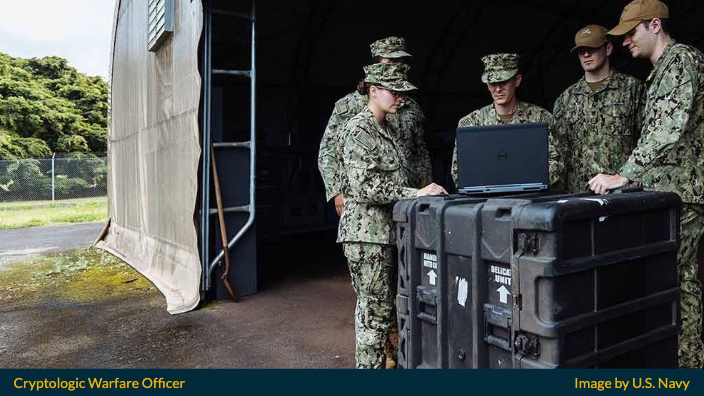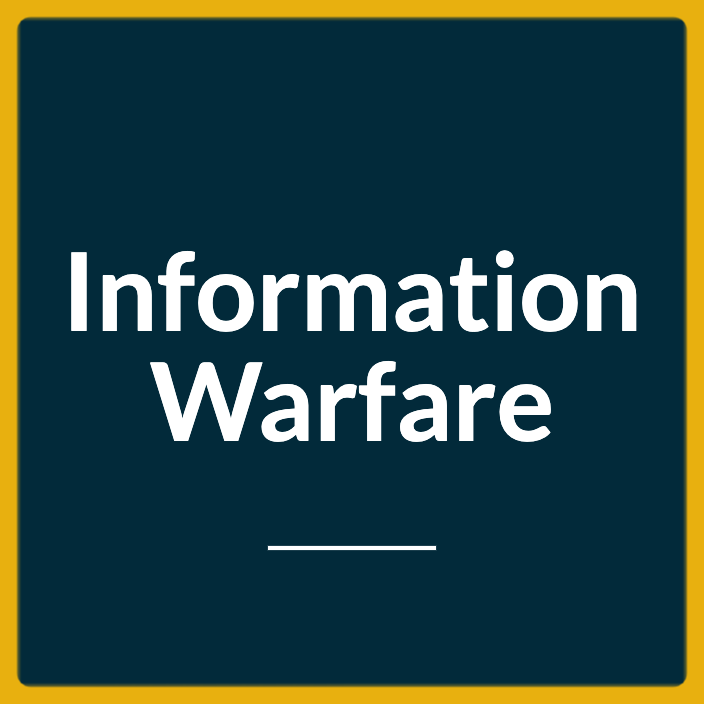Last Updated on March 4, 2024
This guide provides useful information that will help you with your decision to become a Navy Cryptologic Warfare Officer during Fiscal Year 2024.
As you will see, there are a lot of aspects to this program.
Let us start with basic descriptions.
What is a Cryptologic Warfare Officer?
A Navy Cryptologic Warfare Officer (CWO) is a Restricted Line Officer who is in charge of enabling the Navy with capabilities in cyberspace operations, cryptology, electronic warfare, signals intelligence, and space to maintain freedom of action while achieving naval objectives within space, cyberspace, and the electromagnetic spectrum.

CWOs are members of the Navy’s Information Warfare Officer Community, along with Intelligence, Information Professionals, Oceanography, and Cyber Warfare Engineers.
Their mission is to defeat any adversary by utilizing Assured Command and Control, Integrated Fires, and Battlespace Awareness to achieve Freedom of Maneuver across all war and battle domains.
CWOs are technically proficient as well as good communicators, capable of converting complicated technical difficulties into operationally useful information for Naval and Joint Commanders.
What do Cryptologic Warfare Officers do?
Cryptologic Warfare Officers deliver competitive outcomes across all domains of conflict by using Cyberspace Operations, Signals Intelligence, and Electronic Warfare.
They support and defend American interests, function as a fully integrated member of the Information Warfare Community (IWC) by optimizing combat power by merging Assured Command and Control, Integrated Fires, and Battlespace Awareness.
To do this, CWOs must collaborate with all IWC elements, including intelligence, meteorology, oceanography, cryptology, communications, and cyber warfare engineers.
CWOs are closely involved in all aspects of Naval operations, supplying information to decision-makers by attacking, protecting, and exploiting networks to capitalize on weaknesses in the information domain.
They require a deep grasp of sensors and weapons, strategy and tactics, as well as the capabilities and limits of national systems.
The Cryptologic Warfare community is vital to naval superiority.
CWO responsibilities may include:
- Real-time signal intelligence collection, processing, analysis, and reporting
- Carrying out computer network procedures
- Creating and acquiring cutting-edge attack and defensive systems
- During drills and operations, planning and delivering information warfare impacts
- In charge of Information Warfare personnel in a range of military activities.
- Supervising the work of Cryptologic Technicians – Enlisted Sailors (no degree necessary) who work as cryptology specialists.
Cryptologic Warfare Officer Career Path
CW Officers serve on nearly every Navy platform, not just on warships.
For instance, they may serve in special operations and expeditionary forces.
You may also find them across the Intelligence Community and the Cyber Mission Force, even in every major Navy and Joint staff positions.
The majority of CWOs begin their careers at a large cryptologic facility, where they study their profession and get a solid basic grasp of signals intelligence, electronic warfare, and cyberspace operations.
Follow-on tours are quite diverse, allowing officers to deepen their knowledge and acquire significant expertise in certain sectors of the CW community.
At every paygrade, CWOs have sea-going tasks and are frequently deployed in support of Naval and Joint operations.
Postgraduate education is critical to the CW community’s prosperity.
Many CWOs will be able to pursue a Master’s degree at the Naval Postgraduate School in Space Systems Operations/Engineering, Electrical Engineering, Cyber Systems and Operations, Computer Science & Systems Design, Modeling, Operations Research, or Virtual Environments & Simulation. There are also a few PhD positions available.
Cryptologic Warfare Officer Duty Stations
Cryptologic Warfare Officers perform crucial roles both afloat and onshore. This might include:
- Alternating between sea, shore, and academic tours
- Working at a National Security Agency Cryptologic Center
- Serving on ships, submarines, and naval aircrafts
- Providing assistance to Naval Special Warfare/ Special Operations
- Serving in positions ranging from the National Security Agency through the Pentagon
- Cryptologic Warfare Officer deployments
Cryptologic Warfare Officer Pipeline
Those interested in becoming a Cryptologic Warfare Officer must first attend Officer Candidate School (OCS) in Newport, Rhode Island.
Also Read: Navy OCS Guide for Officer Applicants
New CW Officers are then required to attend the following training courses:
- The Division Officer Leadership Course (1 week) in Dam Neck, VA prepares new officers for their prospective leadership duties.
- The Information Warfare Basic Course (3 weeks), which is also held at Dam Neck, VA, introduces incoming officers to the diverse set of talents that comprise the Information Warfare Officer Community.
- The last stop is the 8-week Cryptologic Warfare Officer Basic Course in Pensacola, FL addresses the fundamental core capabilities of CW and prepares CWs for their initial fleet assignment in a major cryptologic facility.
To qualify as Information Warfare Officers, CW officers must pass a number of CW-specific certifications (IWOs) to complete the cryptologic warfare officer qualification program.
Cryptologic Warfare Officer Requirements
The basic eligibility requirements below are current as of May 2022. No updates have been issued so far.
Basic Eligibility
1) Citizenship
Cryptologic Warfare applicants must be United States citizens.
2) Age
Applicants must be between 18 years old and 42 years old at the time of commissioning. This is waiverable.
Surface Warfare Officer (SWO) (CW option) candidates must be under the age of 35 at the time of commissioning.
3) Education
At least a baccalaureate degree from an accredited institution is required to apply.
Major subjects of study directly relevant to science, technology, engineering, and mathematics are desirable but not needed.
A total undergraduate grade point average (GPA) of 3.0 or above on a 4.0 scale is necessary. If a candidate’s total undergraduate GPA is higher than 2.7, they may request a waiver.
An undergraduate degree with a non-qualifying GPA may be superseded by a graduate-level degree issued by an accredited institution with a cumulative graduate program GPA of 3.0 or above on a 4.0 scale.
A “C” average or better in the calculus series (Calculus I and Calculus II) and the calculus-based physics sequence (Physics I and Physics II) is desired but not mandatory.
4) Physical
Candidates must be physically qualified for sea duty assignments and be ready for international deployment, according to the Medical Department Manual, Chapter 15.
5) Aptitude
The Officer Aptitude Rating (OAR) examination is required of all candidates.
Applicants must have an OAR score of 45 or above, waiverable to 40 for otherwise competitive applicants.
The most crucial requirement that you can fully control is your OAR score. It is the primary objective criteria upon which all applicants are compared against.
To maximize your chances of obtaining an exceptional OAR score, we only recommend this OAR Study Guide for your success. All others are mediocre at best.
6) Work Experience
Expertise in cyber security, electronic warfare, engineering, computer science, mathematics, information technology, or signals intelligence is greatly preferred.
Military job experience must be confirmed by submitting three most recent observed enlisted performance evaluations. This may be waived.
7) Leadership Experience
A demonstrable track record of leadership, managerial, or supervisory experience in academia, civilian, or military institutions is greatly preferred.
8) Security Clearance Eligibility
For access to sensitive compartmented material, candidates must fulfill the Director of National Intelligence’s (DNI) Intelligence Community Directive (ICD) 704 eligibility rules.
Prior to final selection as an officer candidate, applicants who are nominated for a commission into the Active Component must pass an initial suitability screening with the Fleet Cyber Command Security Directorate.
Being a dual citizen (i.e., a US citizen and a citizen of another nation) is not always an impediment. Risks to national security shall be assessed on a case-by-case basis, in accordance with ICD 704.
9) Waivers
In circumstances when the candidate does not satisfy all of the standards but has an extraordinary record or demonstrated skill set that the Navy requires, a waiver may be granted in limited proportions.
Service Obligation
Selectees will be required to serve on active duty for 4 years beginning on the day of their appointment.
The remaining service, enough to fulfill 8 years total obligatory service, may be spent in a Ready Reserve status.
SWO (CW Option): Upon redesignation to 1810, SWO (CW Option) officer selectees are subject to an extra minimum service requirement in accordance with MILPERSMAN 1212-050, which must be fulfilled simultaneously with any other responsibilities.
More Information
If you want more information about becoming a Navy Cryptologic Warfare Officer, the next logical step is to contact a Naval Officer Recruiter.
Let us start figuring out how you can benefit from the Navy – or if it is even the right move for you considering your current life situation.
Others were also interested in other secretive positions, such as the Cyber Warfare Engineering Officer or the Information Professional jobs. Check them out.
Hope this was helpful for your career planning.


